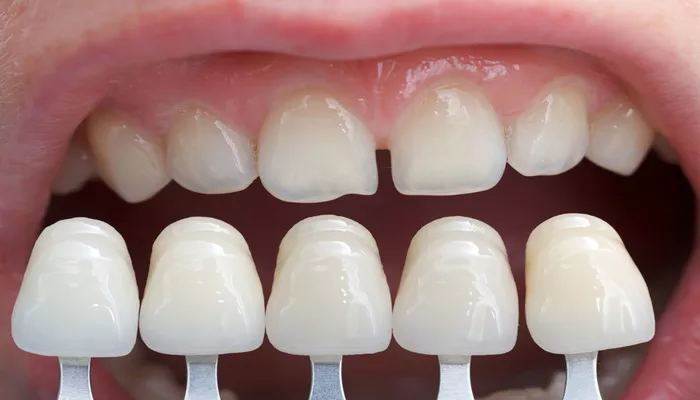Dental veneers are a popular solution for achieving a perfect smile. They are thin shells, usually made of porcelain or composite resin, that are bonded to the front surface of teeth. Veneers can correct various dental imperfections such as discoloration, chipped teeth, gaps, and uneven alignment. One of the most common questions patients ask is: How long do dental veneers last? This article explores the lifespan of dental veneers, the factors affecting their durability, and tips for prolonging their longevity.
What Are Dental Veneers?
Dental veneers are custom-made restorations designed to enhance the appearance of teeth. They are crafted to match the natural color and shape of your teeth, providing a seamless look. Veneers are often chosen for their durability, aesthetic appeal, and ability to transform a smile quickly.
Types of Dental Veneers
Porcelain Veneers:
Made from durable ceramic material.
Resistant to staining.
Mimic the natural translucency of tooth enamel.
Composite Resin Veneers:
Made from a tooth-colored resin material.
Less expensive than porcelain veneers.
Require less tooth enamel removal.
How Long Do Porcelain Veneers Last?
Porcelain veneers typically last between 10 and 15 years. With proper care, some patients report veneers lasting even longer. Porcelain is a strong material, but it is not indestructible. Over time, the bonding material may weaken, or the veneers may crack, chip, or wear down.
How Long Do Composite Veneers Last?
Composite resin veneers have a shorter lifespan compared to porcelain veneers, usually lasting between 5 and 7 years.
They are more prone to staining and wear due to their less durable material. However, they are easier and less expensive to repair or replace.
Factors Affecting the Lifespan of Dental Veneers
Several factors influence how long dental veneers will last:
1. Material Quality
Porcelain veneers last longer than composite resin veneers due to their superior durability.
2. Oral Hygiene Practices
Good oral hygiene, such as regular brushing and flossing, helps prevent decay and gum disease that could compromise the veneers.
3. Dietary Habits
Avoiding hard foods, such as ice or hard candies, reduces the risk of chipping veneers.
Limiting the intake of staining substances like coffee, tea, and red wine helps maintain their appearance.
4. Bruxism (Teeth Grinding)
Teeth grinding or clenching can cause veneers to crack or wear down prematurely. Wearing a night guard can help protect them.
5. Professional Maintenance
Regular dental check-ups allow your dentist to monitor the condition of your veneers and address any issues early.
6. Bonding Technique
Proper placement and bonding by an experienced dentist contribute to the longevity of veneers.
How to Care for Dental Veneers
Proper care is essential for maximizing the lifespan of dental veneers. Here are some tips:
1. Maintain Good Oral Hygiene
Brush your teeth twice a day with a non-abrasive toothpaste.
Floss daily to prevent plaque build-up.
2. Avoid Damaging Habits
Do not use your teeth to open packages or bite on hard objects.
Avoid chewing on pens, ice, or fingernails.
3. Wear Protective Gear
Use a mouthguard during sports or a night guard if you grind your teeth.
4. Visit Your Dentist Regularly
Schedule check-ups and cleanings every six months to ensure your veneers remain in good condition.
5. Be Mindful of Your Diet
Limit foods and beverages that can stain or damage veneers.
Consume a balanced diet to support overall oral health.
Signs That Veneers Need Replacement
Even with the best care, veneers may eventually need replacement. Watch for these signs:
Chips or Cracks: Damage to the veneer surface can compromise its appearance and function.
Staining: Composite veneers may develop stains that cannot be removed with regular cleaning.
Gum Recession: If your gums recede, the edges of your veneers may become visible, affecting aesthetics.
Loosening or Falling Off: Bonding material may weaken over time, requiring replacement.
When to Consult Your Dentist
If you notice any issues with your veneers, such as discomfort, discoloration, or damage, schedule a dental visit immediately. Early intervention can prevent further complications and help you maintain your smile.
Conclusion
Dental veneers are a long-lasting and effective solution for improving the appearance of your teeth. Porcelain veneers can last 10 to 15 years, while composite veneers typically last 5 to 7 years. Factors such as material quality, oral hygiene, and lifestyle habits play a significant role in their longevity. By following proper care practices and attending regular dental check-ups, you can extend the life of your veneers and enjoy a confident smile for years to come.
Related topics:
- The 6 Best Toothpastes for Bad Breath
- What Are The Home Remedies for Bad Breath
- What Causes Bad Breath?

